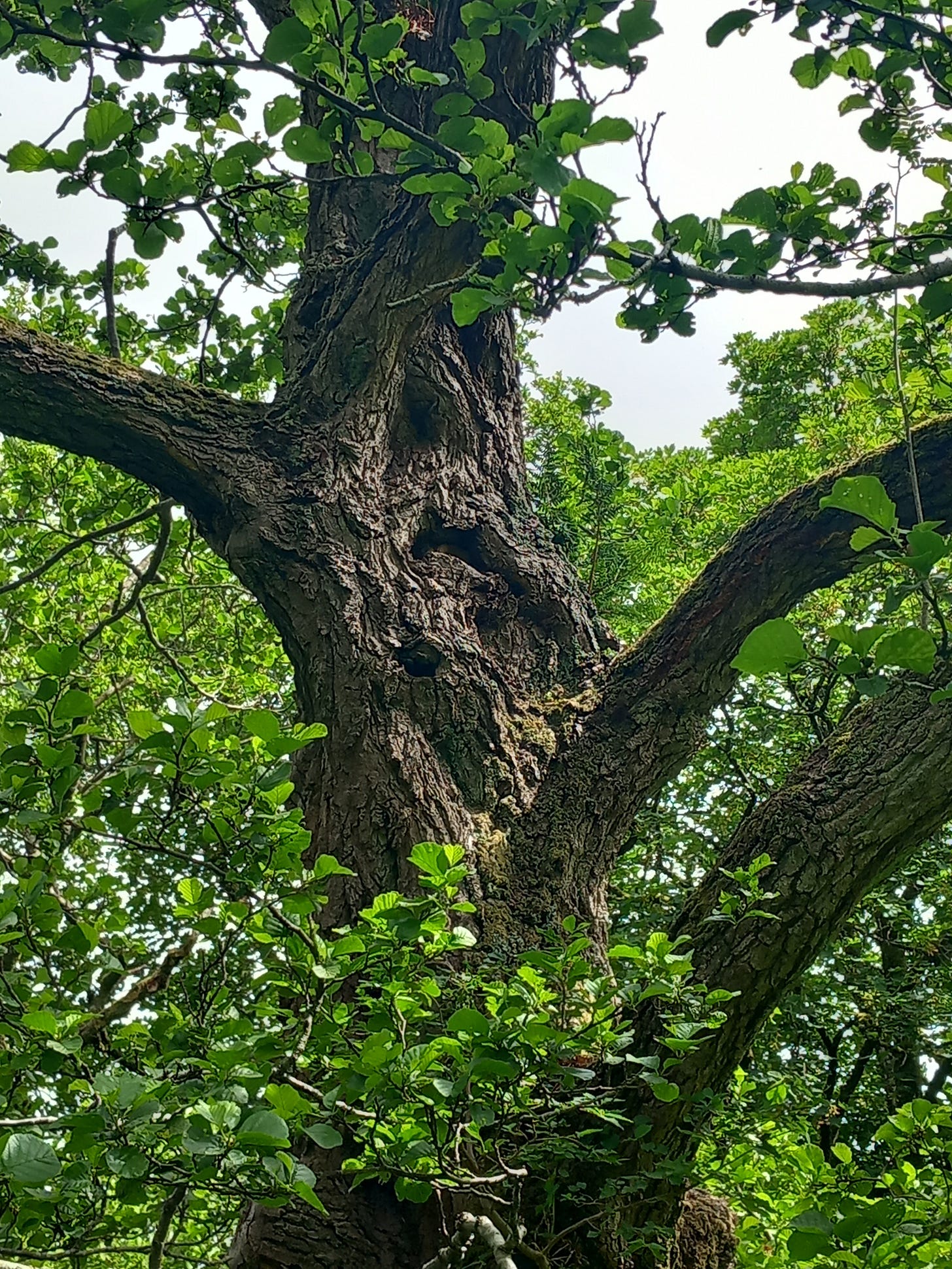They say that newly-hatched birds will imprint onto just about anything which moves. We once incubated a clutch of goslings. We were tired of their daffy parents wandering off and forgetting where they had laid. The first time the little yellow tooters came out to play, ‘foo-foo’, they met our golden retriever, sanguine and avuncular. He pretended to be unimpressed by their devotion to him. But they never forgot. White and grown and boisterous, they would rush over and call to him whenever he walked down the field.
When a child first pips the eggshell of their small world and emerges into consciousness, what might they see that will stay with them forever? In my waking dreams and in my night travels I see stands of alders1 by my side. I cannot visualise a world without them. The orange blaze of their waterlogged roots, the warp and contort of their twisted limbs, the split-end frizz of their thinning hair. These trees are as familiar as the fingers of my own hands. They were there when I first opened my eyes at the water’s edge, to find my own earnest little face looking back from a stream’s playful mirror.
Before they had a name, before anything had a name, alders watched over me as I clambered careless among their quiet patience. Just as all of them had been before me, I was a sapling water-child, feet wet, my attention drawn to the bottom of a clearwater pool. The old trees of the bankside were my whispering guardians, a cadre of veteran knights, sworn to my protection. Their heads bent in chivalrous prayer over every lowland brook I travelled. Their knotted arms meshed to conceal the secret origins of the forgotten Welsh rivers I met and loved, the young headwaters and I on the joyful snaking path to adulthood and the distant ocean. The fire of the alders’ smouldering-ember roots warmed my cold feet. The winking gargoyle faces in their fissured bark were company enough.
I was the skinny wet heir to a barefoot water palace in the westerlands. You will not find it on any map. It lies beyond the blue remembered hills. Moorhens in full regalia strutted the sandbars, insisting on ceremony and protocol. Herons recited the annals of the mighty pike who once lived under Jinty Bridge. The Monnow and the Troddi, the Mally Brook and the old mill race, all doors were open to me, my socks stuffed into tattered trainers for safe-keeping and left up in the grass. If only someone had stolen them away I might have stayed forever with the gudgeon and the lamprey, unable to return to dry land. But nobody ever came to the crystal-clear corridors and cloisters of this petty kingdom of mine. My shoes were always where I had left them, hours before.
Perhaps it was the frequent immersion which kept the skin-bag of my body permeable for so long. Well past the time when it was supposed to have sealed itself off, closed the castle gates to creatures which are not me. I shared the amniotic fluid of Bellshore Brook with the pin-fry who nibbled my feet. I suppose that makes us siblings.
Legs feel overweight after hours in the partial gravity of buoyancy. Like an astronaut returning from space at the end of a long sunny afternoon. I would grasp a handhold in the labyrinthine bark of an ancient alder to haul myself heavy out of the water, softened fingertips puckered and wrinkled. Was that when some fragment of alder crossed the blood barrier and spliced itself into my story?
There are ancient alders below me as I write. At the bottom of the steep slope of the garden they hold the line against the periodic flash and ferment of the upper Eden, her moods famously volatile. In spring my eyes swoon at a profusion of alder buds and receive the sacrament of their faint lilac aftertaste. We are old now, these trees and I. Nearer to the ocean than the source. In one another’s company we are comfortable with silence. And anyway, they have other charges to look after. Emerging from the hollow trunks and the limb-fallen scars there is a crowd of fledgling jackdaws, clacking and hopping and telling it how it is. The blue-eyed birds and I, we share a fosterage. I suppose that makes us cousins
.
Perhaps you live in a part of the world where alders do not grow. They are common native trees here on our little island off the coast of Europe, specially adapted to thrive in waterlogged soils. Alders are not glamorous or showy but their orangey-red roots, often exposed by floods, can tolerate permanent immersion, allowing the trees to stand right at the water’s edge.






Siblings, cousins to alders - oh yes! I was a dry land child and oak trees grew around me. I spent long afternoons climbing as high as I could to my nest protected in the branches. This one oak was old, gnarled, and had spacious branches strong enough to hold me. That tree knew every thought and feeling I had growing up - my heart in her heart. Thank you David for allowing this childhood memory come alive. Today I live with maples!
To the one reared by brook and alder, a dreamlike telling tracing the embered roots of your apprenticeship to the wild world. Quietude and love everlasting breathes through it all. Did you choose your home for the river and the alders? They look back at me with wise faces. xo